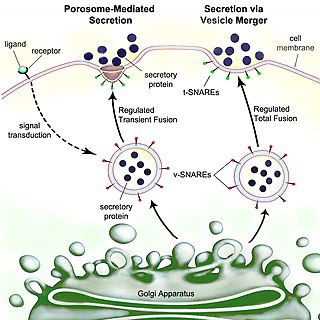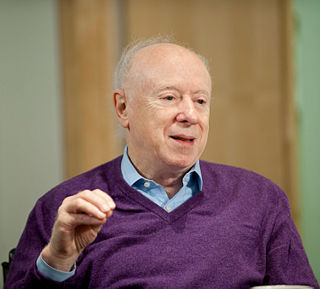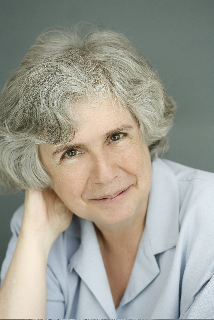
The American Society for Microbiology (ASM), originally the Society of American Bacteriologists, is a professional organization for scientists who study viruses, bacteria, fungi, algae, and protozoa as well as other aspects of microbiology. It was founded in 1899. The Society publishes a variety of scientific journals, textbooks, and other educational materials related to microbiology and infectious diseases. ASM organizes annual meetings, as well as workshops and professional development opportunities for its members.

Secretion is the movement of material from one point to another, such as a secreted chemical substance from a cell or gland. In contrast, excretion is the removal of certain substances or waste products from a cell or organism. The classical mechanism of cell secretion is via secretory portals at the plasma membrane called porosomes. Porosomes are permanent cup-shaped lipoprotein structures embedded in the cell membrane, where secretory vesicles transiently dock and fuse to release intra-vesicular contents from the cell.

Joseph Leonard Goldstein ForMemRS is an American biochemist. He received the Nobel Prize in Physiology or Medicine in 1985, along with fellow University of Texas Southwestern researcher, Michael Brown, for their studies regarding cholesterol. They discovered that human cells have low-density lipoprotein (LDL) receptors that remove cholesterol from the blood and that when LDL receptors are not present in sufficient numbers, individuals develop hypercholesterolemia and become at risk for cholesterol related diseases, notably coronary heart disease. Their studies led to the development of statin drugs.
Jonathan Roger Beckwith is an American microbiologist and geneticist. He is the American Cancer Society Professor in the Department of Microbiology and Immunobiology at Harvard Medical School in Boston, Massachusetts.

Pascale Cossart is a French bacteriologist who is affiliated with the Pasteur Institute of Paris. She is the foremost authority on Listeria monocytogenes, a deadly and common food-borne pathogen responsible for encephalitis, meningitis, bacteremia, gastroenteritis, and other diseases.
The Edward Novitski Prize is awarded by the Genetics Society of America (GSA) to recognize an extraordinary level of creativity and intellectual ingenuity in solving significant problems in genetics research.
Inder Mohan Verma is an Indian American molecular biologist, the former Cancer Society Professor of Molecular Biology in the Laboratory of Genetics at the Salk Institute for Biological Studies and the University of California, San Diego. He is recognized for seminal discoveries in the fields of cancer, immunology, and gene therapy.

Susan Gottesman is a microbiologist at the National Cancer Institute (NCI), which is part of the National Institutes of Health. Gottesman has been the editor of the Annual Review of Microbiology since 2008.
David Chaim Rubinsztein FRS FMedSci is the Deputy Director of the Cambridge Institute of Medical Research (CIMR), Professor of Molecular Neurogenetics at the University of Cambridge and a UK Dementia Research Institute Professor.
Sandhya Srikant Visweswariah is a scientist and academic at the Indian Institute of Science, Bangalore, India. She is currently the Chairperson of the Department of Molecular Reproduction, Development and Genetics and the Co-chair of the Centre for Biosystems Science and Engineering, Indian Institute of Science. She additionally holds the position of Adjunct Professor, Faculty of Medicine and Dentistry, University of Bergen, Norway. Her research involves the investigation of the mechanism of signal transduction via cyclic nucleotides, phosphodiesterases and novel cyclases in bacteria. Most recently, she was awarded a Bill and Melinda Gates Grand Challenges Explorations Grant for her proposal entitled "A Small Animal Model of ETEC-Mediated Diarrhea".
BamA is a β-barrel, outer membrane protein found in Gram-negative bacteria and it is the main and vital component of the β-barrel assembly machinery (BAM) complex in those bacteria. BAM Complex consists of five components; BamB, BamC, BamD, BamE and BamA. This complex is responsible in catalyzing folding and insertion of β-barrel proteins into the outer membrane of Gram-negative bacteria.

Kaustuv Sanyal is an Indian molecular biologist, mycologist and a professor at the Molecular Biology and Genetics Unit of the Jawaharlal Nehru Centre for Advanced Scientific Research (JNCASR). He is known for his molecular and genetic studies of pathogenic yeasts such as Candida and Cryptococcus). An alumnus of Bidhan Chandra Krishi Viswavidyalaya and Madurai Kamaraj University from where he earned a BSc in agriculture and MSc in biotechnology respectively, Sanyal did his doctoral studies at Bose Institute to secure a PhD in Yeast genetics. He moved to the University of California, Santa Barbara, USA to work in the laboratory of John Carbon on the discovery of centromeres in Candida albicans. He joined JNCASR in 2005. He is a member of the Faculty of 1000 in the disciplines of Microbial Evolution and Genomics and has delivered invited speeches which include the Gordon Research Conference, EMBO conferences on comparative genomics and kinetochores. The Department of Biotechnology of the Government of India awarded him the National Bioscience Award for Career Development, one of the highest Indian science awards, for his contributions to biosciences, in 2012. He has also been awarded with the prestigious Tata Innovation Fellowship in 2017. The National Academy of Sciences, India elected him as a fellow in 2014. He is also an elected fellow of Indian Academy of Sciences (2017), and the Indian National Science Academy (2018). In 2019, he has been elected to Fellowship in the American Academy of Microbiology (AAM), the honorific leadership group within the American Society for Microbiology.

Tracy Palmer is a professor of microbiology in the Biosciences Institute at Newcastle University in Tyne & Wear, England. She is known for her work on the twin-arginine translocation (Tat) pathway.
Gregory James Hannon is a professor of molecular cancer biology and director of the Cancer Research UK Cambridge Institute at the University of Cambridge. He is a Fellow of Trinity College, Cambridge while also serving as a director of cancer genomics at the New York Genome Center and an adjunct professor at Cold Spring Harbor Laboratory.

Bacterial secretion systems are protein complexes present on the cell membranes of bacteria for secretion of substances. Specifically, they are the cellular devices used by pathogenic bacteria to secrete their virulence factors to invade the host cells. They can be classified into different types based on their specific structure, composition and activity. Generally, proteins can be secreted through two different processes. One process is a one-step mechanism in which proteins from the cytoplasm of bacteria are transported and delivered directly through the cell membrane into the host cell. Another involves a two-step activity in which the proteins are first transported out of the inner cell membrane, then deposited in the periplasm, and finally through the outer cell membrane into the host cell.

Karla Kirkegaard is the Violetta L. Horton Research Professor of genetics at the Stanford University School of Medicine. She was the chair of the Department of Microbiology and Immunology from 2006 to 2010. She is an elected member of the American Academy of Arts and Sciences and the National Academy of Sciences. Her research focuses on virology.

Joseph Heitman is an American physician-scientist focused on research in genetics, microbiology, and infectious diseases. He is the James B. Duke Professor and Chair of the Department of Molecular Genetics and Microbiology at Duke University School of Medicine.
Marian Bille Carlson is a geneticist and the Director of Life Sciences at the Simons Foundation. She is a member of the National Academy of Sciences and a past president of the Genetics Society of America.
Kenneth Ira Berns (1938-2024) was an American virologist who was a distinguished professor emeritus at the department of Molecular Genetics and Microbiology at the University of Florida College of Medicine. He is primarily known for his work on adeno-associated viruses (AAV), and his group was one of the first which showed the specificity of the integration of the AAV genomes into the cellular genome. He was a member of the National Academy of Sciences from 1995-2024.

Harmit Singh Malik is an Indian American evolutionary biologist who is a professor and associate director at the Fred Hutchinson Cancer Research Center. He was awarded the 2022 Genetics Society of America Edward Novitski Prize.











